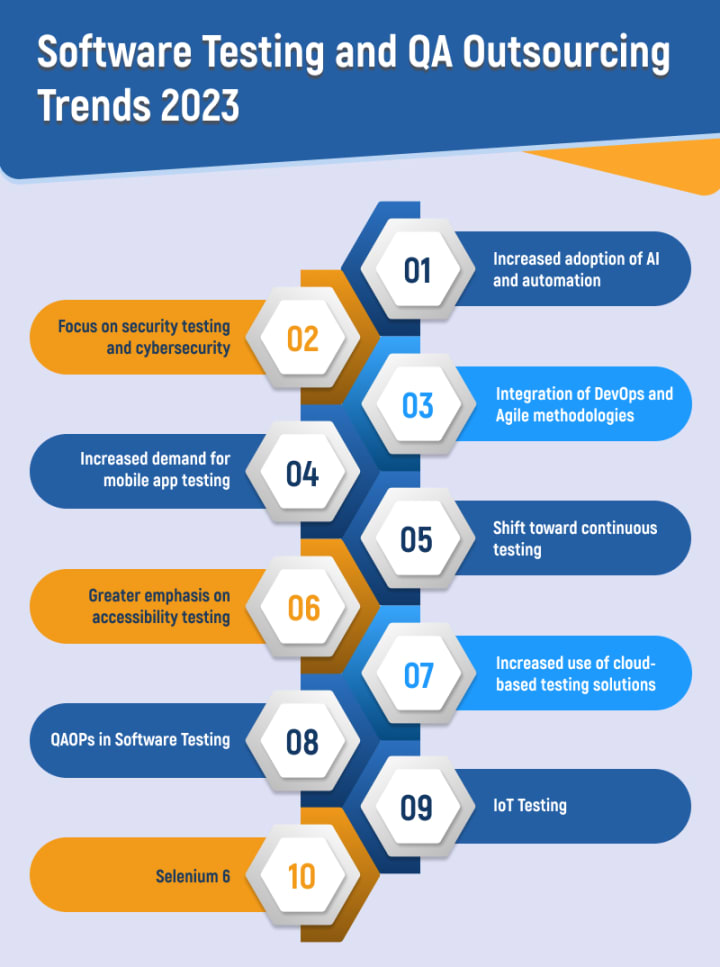The Top Trends in Software Testing and QA Outsourcing for 2023
Navigating the Future: Unveiling the Top Software Testing and QA Outsourcing Trends in 2023

In today's digital era, quality is of utmost importance in software development. With the widespread acceptance and adoption of technology, companies are now focusing more than ever on ensuring software reliability and eliminating errors. As the world continues to navigate the challenges of the pandemic, software firms are evolving their testing and quality assurance strategies to stay ahead of the curve.
In 2022, we saw a significant shift in software quality testing trends, with companies integrating agile testing earlier in the software development process. These software testing trends are expected to continue and evolve in the coming year as businesses strive to keep pace with emerging technologies and changing customer demands.
This blog will explore the top trends in software QA and testing services for 2023, including the increased adoption of AI and automation, the growing emphasis on security testing and cybersecurity, and the benefits of outsourcing to specialized providers. Join us as we discover how these trends are shaping the future of software development.
Trend #1: Increased adoption of AI and automation
The first trend we'll explore is the increased adoption of AI and automation in mobile app testing. They are used to analyze data, identify patterns, and create automated test scripts. This approach can reduce testing time and improve coverage.
Tools like anomaly detection can improve defect identification and resolution accuracy and effectiveness. Overall, the increased adoption of AI and automation in software testing is expected to continue in 2023 and beyond as companies seek to improve software quality while reducing testing costs and time to market.
Trend #2: Focus on security testing and cybersecurity
The second software testing trend we'll explore is the growing focus on security and cybersecurity. With the increasing number of cyber threats and attacks, companies are taking a more proactive approach to security testing to protect their software and customers.
This includes testing software for vulnerabilities and weaknesses that attackers could exploit and ensuring that software is designed with security in mind. Companies are investing in specialized security testing tools and technologies and incorporating security testing into their overall software development process to protect their software and customers from an increasingly sophisticated and dangerous threat landscape.
Trend #3: Integration of DevOps and agile methodologies
The third trend we'll explore is the integration of DevOps and agile methodologies in software testing. DevOps practices like continuous integration and delivery automate the testing process and enable faster releases, while agile testing frameworks like BDD and TDD promote collaboration between developers and testers. You can hire software QA developers who will combine these methodologies to make testing more efficient and effective for the development process.
You can hire software QA developers who will combine these methodologies to make testing more efficient and effective for the development process. Tools like Jenkins, GitLab, and Bitbucket can automate testing, and cloud-based testing environments like AWS and Azure can provide on-demand testing and scalability. The integration of DevOps and agile methodologies in software testing will continue in 2023 as companies seek to improve their software development process's speed, efficiency, and quality.
Trend #4: Increased demand for mobile app testing
The fourth trend we'll explore is the increased demand for mobile app testing. Companies invest in specialized mobile testing tools and technologies to ensure their apps function seamlessly across devices, operating systems, and hardware configurations. Tools like Appium, Calabash, and TestComplete can automate mobile app testing, and cloud-based mobile testing platforms like AWS Device Farm, and Firebase Test Lab enable testing on multiple devices simultaneously.
The demand for mobile app testing is expected to increase in 2023 as the use of mobile devices continues to grow and companies prioritize delivering high-quality mobile applications to their users.
Trend #5: Shift toward continuous testing
The fifth software testing trend we'll explore is the shift toward continuous testing. Continuous testing involves testing early and often throughout the software development process, reducing the cost and effort required to fix defects.

This approach involves using automation tools like Selenium and Appium and cloud-based testing platforms like Sauce Labs and BrowserStack. The shift towards continuous testing is expected to continue in 2023 as companies seek to improve their software development process's speed and quality by adopting continuous testing practices and leveraging automation tools.
Trend #6: Greater emphasis on accessibility testing
The sixth trend we'll explore is the greater emphasis on accessibility testing. Companies are investing in specialized tools like Axe, Wave, and ChromeVox to ensure their products comply with accessibility standards like the WCAG.
Additionally, companies are conducting users’ functional software testing solutions for people with disabilities and hiring specialized accessibility testers to improve the user experience for all users. The emphasis on accessibility testing will continue in 2023 as companies seek to create more inclusive products and avoid potential legal and reputational risks.
Trend #7: Increased use of cloud-based testing solutions
The seventh software testing trend is the increased use of cloud-based testing solutions. Cloud-based testing solutions like Sauce Labs, BrowserStack, and AWS Device Farm provide a wide range of devices, platforms, and environments for testing web and mobile applications.
By leveraging these solutions, companies can reduce the need for on-premises testing infrastructure and achieve faster time-to-market. The increased use of cloud-based testing solutions is expected to continue in 2023 as companies seek to improve their testing scalability, reduce costs, and improve software quality.
Trend #8: QAOPs in Software Testing
QAOPs is a software testing trend that aims to integrate quality assurance (QA) processes into the software development lifecycle (SDLC) through automation and collaboration with development and IT operations teams. This approach ensures that QA practices are embedded throughout the SDLC rather than being a separate and distinct phase.
By integrating QA processes into the SDLC, QAOPs aim to achieve faster release cycles, fewer errors, and better software quality. This trend is expected to continue in 2023 as more companies adopt agile and DevOps methodologies and seek to improve the efficiency and effectiveness of their testing and QA processes.
Trend #9: IoT Testing
The Internet of Things (IoT) has become increasingly popular across various industries, such as healthcare, robotics, and utilities. As a result, there is a growing demand for functional software testing solutions that can assist in monitoring, diagnosing, and maintaining IoT devices.
IoT testing involves various forms of testing, including functional and integration, performance, usability, and security. The aim is to ensure the quality of IoT products before they are released. In addition, with the rise of connected devices and the potential for data breaches, security has become a crucial component of IoT testing.
Trend #10: Selenium 6
Selenium 4 is a significant technological advancement in the mobile app testing industry. This new version focuses on improving the user experience, test execution and reporting, concurrency, stability, and performance. Its features include an enhanced Selenium Grid architecture, a W3C standardized protocol, revamped IDE, new APIs, relative locators, and advanced diagnostics.
As a popular automation testing tool, Selenium 4 offers flexibility and scalability in automated cross-browser testing of web applications. This tool can potentially revolutionize web automation testing and take it to a whole new level. With emerging trends in software testing, CTOs should consider Selenium 4 to stay ahead of the competition.
Conclusion
In conclusion, software testing and QA outsourcing trends are rapidly evolving in response to the changing technological landscape. Companies are adopting advanced testing technologies, integrating agile methodologies, and focusing on security and accessibility testing, among other software testing trends. AI, automation, and cloud-based solutions are increasing, while the importance of continuous testing and QAOPs is also rising.
Keeping up with these trends is crucial for companies to stay competitive and ensure the delivery of high-quality software products. With these trends in mind, the software testing and QA outsourcing industry are set to experience significant growth and innovation in 2023 and beyond.





Comments
There are no comments for this story
Be the first to respond and start the conversation.